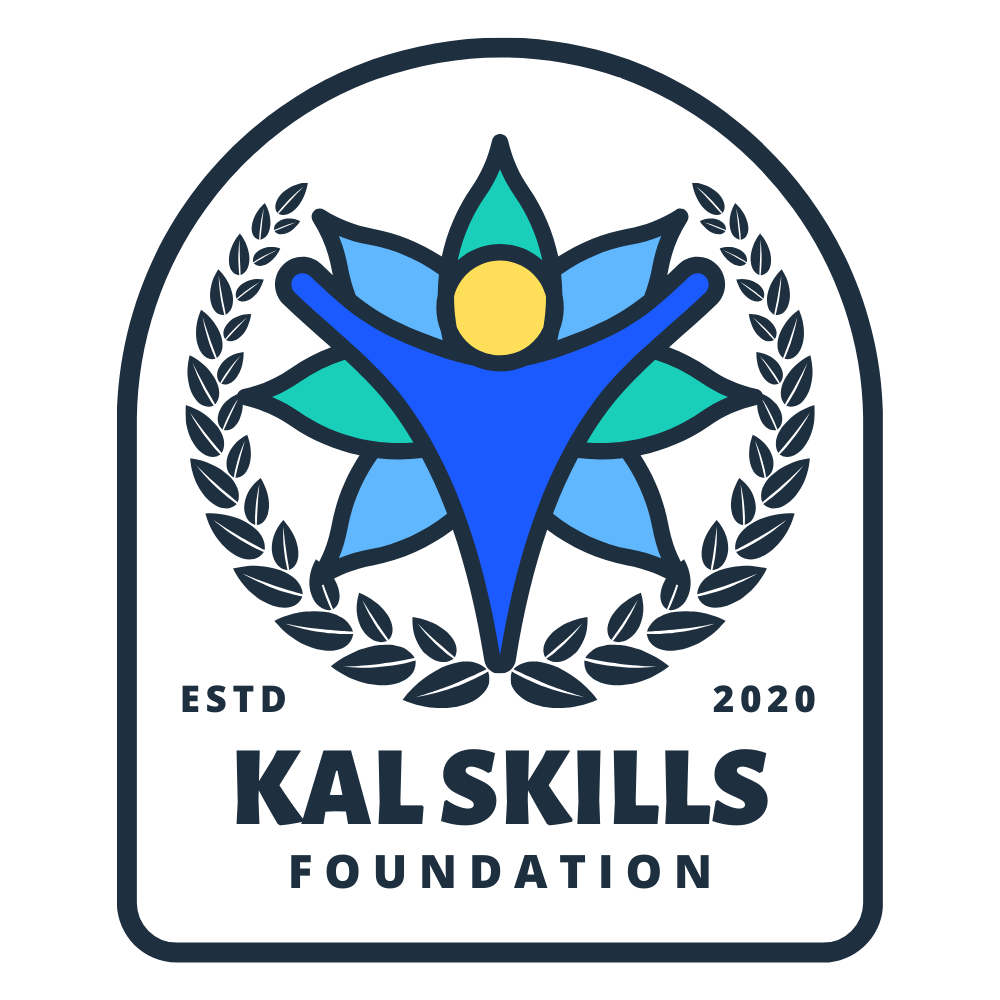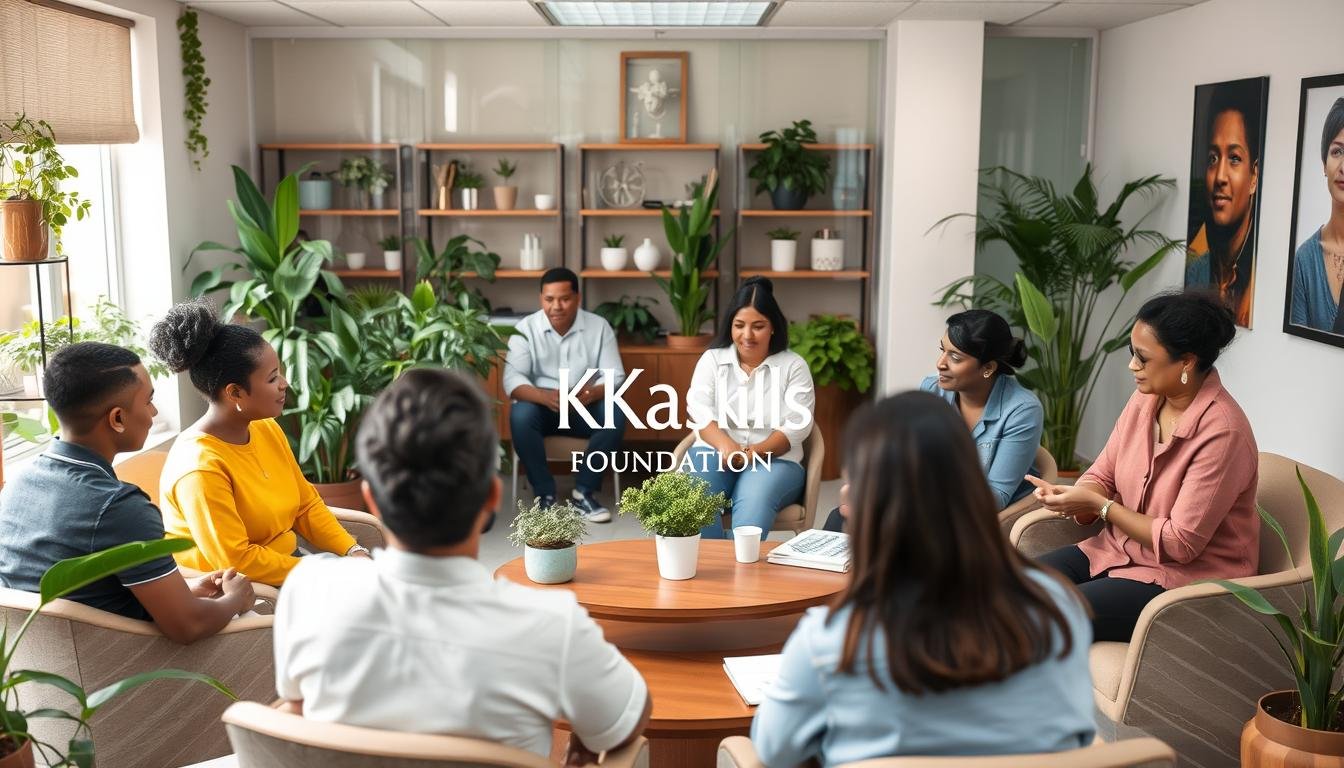Have you ever thought about how one conversation can change someone’s life? The need for personal coaching is growing, making it a great time to start a coaching career. By 2030, the life coaching industry is expected to hit $2.1 billion, showing its huge potential for growth1. Coaches can earn between $150 and $244 an hour, and experienced ones might have up to 15 clients1. But how do you stand out in this competitive field?
This article will guide you through becoming a personal coach. You’ll learn about the role, the skills needed, and the best certification programs. Whether you’re looking for a career change or want to help people, becoming a coach can be life-changing for both you and your clients.
Key Takeaways
- The personal coaching industry is growing rapidly.
- Coaches can charge competitive hourly rates.
- Understanding client readiness is crucial in coaching.
- Certification plays a key role in establishing credibility.
- Building strong relationships with clients leads to impactful coaching.
Understanding the Role of a Personal Coach
Life coaching has become very popular for personal growth and empowerment. It’s important to know the difference between life coaching and therapy. This section will cover the basics of coaching that help with personal growth and reaching goals.
Defining Life Coaching
Life coaching helps clients improve their lives. It’s different from therapy because it focuses on identifying goals and taking steps to achieve them. Coaches support clients, helping them explore and set goals.
Millions of people worldwide are using life coaching. It’s the most common type of coaching. Coaches work in areas like relationship, career, and wellness coaching to meet different needs2.
Active Listening and Communication Skills
Good communication and active listening are key in life coaching. These skills help build trust and make clients feel understood. Coaches use active listening to find out what’s holding clients back.
Understanding clients’ values and goals makes sessions more focused. Coaching relationships are complex, blending communication skills with scientific techniques3.
Key Skills Required to Succeed as a Personal Coach
Being a personal coach means helping clients find themselves and grow. You need skills to connect with them and help them reach their goals. These skills make a big difference in their lives.
Empathy and Emotional Intelligence
Empathy and emotional intelligence are key for a supportive coaching space. They help you understand and respond to your clients’ feelings. A coach with high emotional intelligence builds strong, trusting relationships with clients4.
Being positive helps clients share their feelings and dreams5. This openness leads to deeper conversations and growth.
Effective Problem-Solving Abilities
Coaches need to solve problems well to help clients. Good problem-solving skills help clients find solutions to their challenges4. This empowerment makes them take charge of their growth.
Goal-Oriented Mindset and Adaptability
Having a goal-oriented mindset helps clients set and reach goals. This structured approach helps them see their progress5. Being adaptable means changing your approach to meet each client’s needs. This flexibility keeps your coaching relevant and effective.

| Skill | Description |
|---|---|
| Empathy | Understanding client perspectives to foster open communication. |
| Emotional Intelligence | Recognizing and responding to clients’ emotional needs. |
| Problem-Solving Skills | Identifying client challenges and creating actionable strategies. |
| Goal-Oriented Mindset | Setting clear and achievable goals for clients. |
| Adaptability | Modifying coaching approach based on individual client needs. |
Choosing Your Niche as a Personal Coach
Finding your coaching niche is key to becoming an authority and attracting the right clients. The coaching world is big, with areas like career and wellness coaching growing in popularity. By matching your passions with what’s in demand, you can offer services that really meet client needs.
Popular Coaching Niches: Career, Wellness, and More
Life, health, and career coaching are among the most wanted niches6. As trends change, niches like AI, wellness, and career transition coaching are becoming more important6. Picking a niche lets you become an expert, making it simpler to market and connect with clients.
Assessing Market Demand and Your Interests
It’s vital to research what’s in demand when choosing your coaching area. For example, the “Great Resignation” has made career coaching more popular as people look for new jobs7. Also, relationship coaching is gaining ground, showing a shift in society’s focus on personal connections7. By matching your interests with current trends, you can become a top coach in your niche.
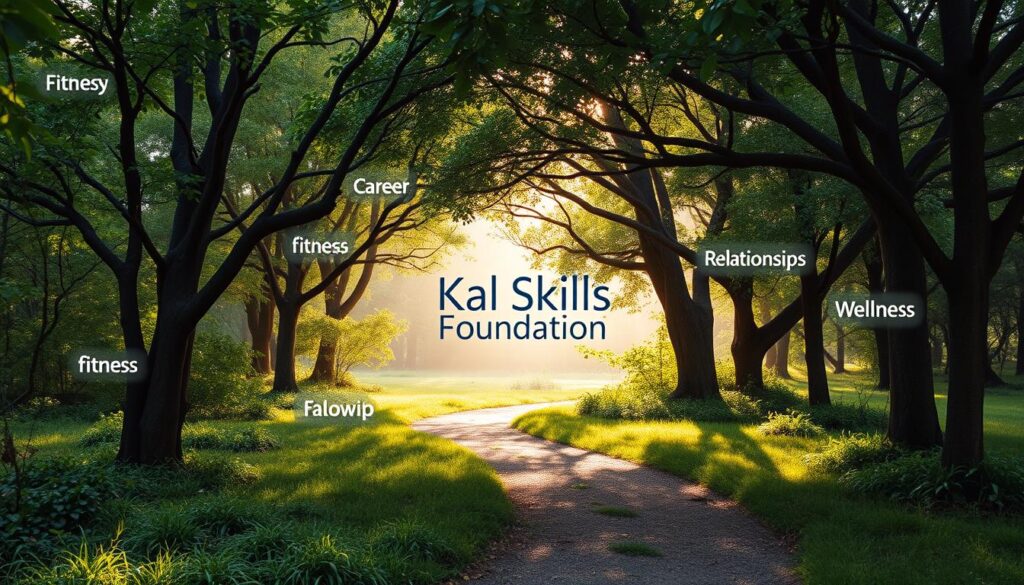
Finding the Right Personal Coach Certification Program
Starting your journey to become a personal coach? Knowing the importance of certification is key. It boosts your credibility and shows you’re serious about your work. With more people seeking life coaching, it’s vital to stand out with a good program.
There are many certification options. Each one helps you grow in your career. You’ll learn about communication, coaching methods, and more. These skills are crucial for being a great coach.
Getting certified can really help your career. It makes you more respected and can bring in more clients. Plus, you’ll join a community that supports and guides you8.
Importance of Certification in Coaching
The ICF coaching federation is at the top of the coaching world. They check and approve training programs and coaches9. A certification shows you’re serious and can open doors to many jobs.
You can work in companies or have your own practice. Coaching offers many paths for your career8.
Reputable Certification Programs
Look for programs that are well-known and respected. The Coach Masters Academy is a good example. They offer an ICF-approved online program with interactive training9.
What others say about a program matters a lot. Also, many schools let you try out their classes for free. This helps you find the right fit for you9.
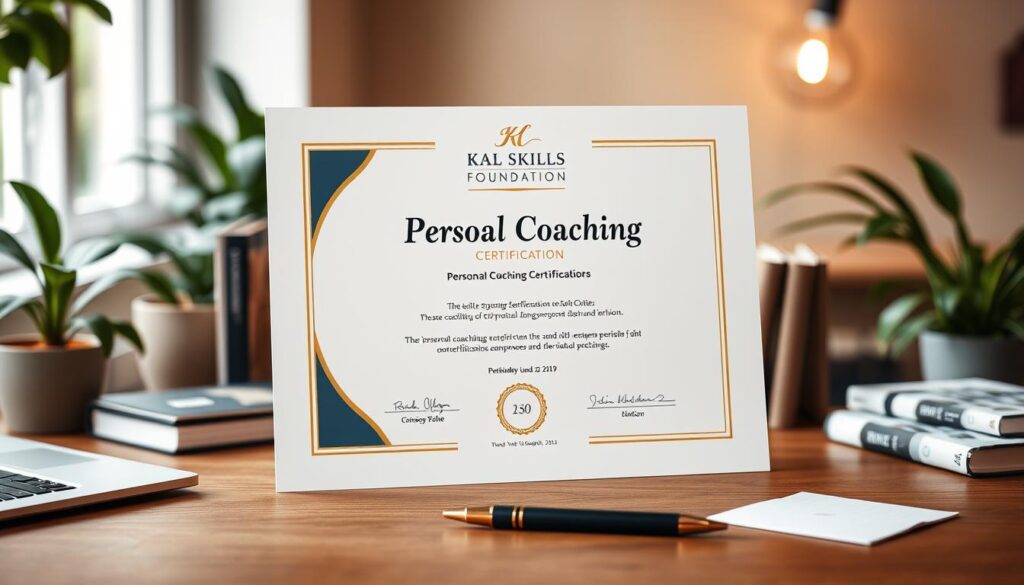
Setting Up Your Coaching Practice
Starting a coaching practice needs careful planning and smart action. You must create a business model that fits your coaching style. This model will guide how you work and interact with clients.
Developing Your Coaching Business Model
Creating your business model is key to understanding how you’ll work in the coaching world. Many coaches find it hard to sell their services, even with lots of resources10. Getting your first clients often comes from friends and referrals, which are very important11.
Knowing your target market and what they need helps you find your niche. This makes your online coaching better.
New coaches often start by offering free sessions to gain confidence and get clients10. Setting a good price for sessions can be tough; prices vary from \$100 to \$100010.
Marketing Strategies for Personal Coaches
Good marketing is essential for attracting clients and getting noticed. Having a strong online presence through social media and a website helps you reach more people, both locally and globally12. Being consistent in your marketing keeps you top of mind for potential clients12.
Also, networking with other coaches or joining groups like the International Coaching Federation helps. It lets you share ideas and get more referrals11. A strong personal brand is key to growing your practice and getting more referrals11.
Building Strong Client Relationships
Creating trust and confidentiality is key for successful coaching. Clients feel safe sharing their thoughts and struggles. Coaches know that building strong client relationships is crucial for their success.
Research shows that clients often feel like they’re visiting a friend. This bond helps them open up about their goals and challenges13. This openness leads to more effective coaching, as clients share important details about their journey.
Creating Trust and Confidentiality with Clients
Trust is the foundation of a productive coaching relationship. Clients must feel safe sharing personal info without fear of judgment. Coaches who actively listen and communicate openly help build trust.
Strong relationships boost clients’ confidence and motivation while reducing stress13. Setting clear goals and expectations also helps build trust, leading to a successful partnership14.
Effective Communication Techniques
Using effective communication techniques is vital for client relationships. Coaches should listen actively and give constructive feedback. Cheering clients on and being open can greatly improve the coaching experience13.
Regular in-person meetings, especially early on, strengthen bonds and build trust13. Good communication skills create a space for self-reflection and accountability. These are essential for personal growth14.
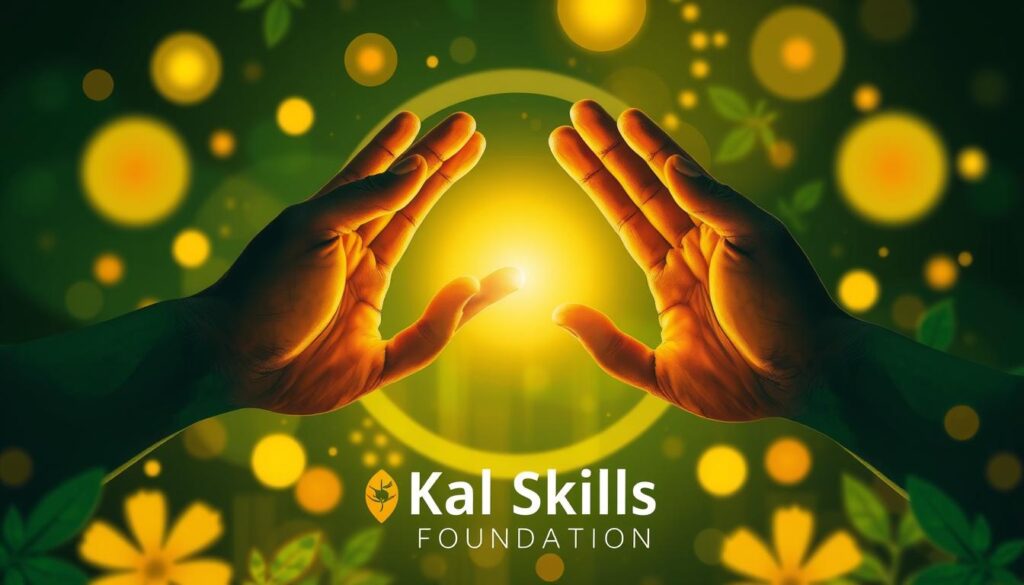
Managing Your Coaching Career
Managing your coaching career means finding a balance between growing professionally and meeting client needs. Senior executives often turn to career coaches to plan their growth and reach their full potential15. As a coach, you must keep up with client demands and grow through workshops, conferences, and mentorship. This keeps you relevant and effective in a fast-changing world.
Balancing Professional Growth and Client Needs
Having a coach early in your career can speed up your path to leadership. They help you develop key skills for moving up15. When looking for a coach, it’s important to know what you want to achieve. This helps you pick the right coach for you15.
Researching different coaches is key. Look at their background, expertise, and what they specialize in. This ensures you find a coach who fits your needs15. Topics like professional branding, presentation skills, and emotional intelligence can help you grow professionally16.
The Role of Continuous Education in Coaching
When searching for a coach, interviewing them is crucial. You want to find someone whose style and expertise match your needs15. Coaching covers many topics, from career questions to skill improvement15.
Staying updated with new methods is essential. Focus on areas like conflict management, team management, and work/life balance. This will help you improve your coaching skills16.
The Impact of a Personal Coach on Clients’ Lives
Personal coaching changes lives by helping set goals and reach important milestones. It boosts self-awareness and personal growth. Coaches guide clients to set SMART goals, giving them clear direction in life and work17.
Helping Clients Set and Achieve Goals
Coaching programs usually last six months to a year. They focus on setting goals that clients can act on. With virtual coaching, clients can join sessions from anywhere, thanks to video conferencing1817.
Transformational Success Stories
Client success stories show the power of coaching. They gain confidence as they see their progress. Coaches help them overcome challenges and celebrate wins, supporting their growth1817.
Conclusion
Starting a career as a personal coach is both challenging and fulfilling. It needs a mix of key skills, specific training, and knowing your area well. You’ll help people understand themselves better, find their strengths, and grow in life areas like work, relationships, and health19.
With more people seeking personal coaching, you can help a lot. This field has grown a lot in the last 20 years20. You’ll help clients reach their goals.
As you grow in your career, remember coaching does more than just help people reach goals. It changes how people think and keeps them on track for lasting change1920. Using tools like visualization and mindfulness can make you a better coach. This benefits you and your clients a lot.
Take the next steps in your coaching career with a positive attitude and a desire to grow. The future is full of chances for you and those you help. You’ll be part of their journey to happiness and success.
FAQ
What is the difference between life coaching and counseling?
How can I find a qualified personal coach near me?
Why is certification important in coaching?
What skills are essential for a successful personal coach?
How do I choose a niche for my coaching practice?
What marketing strategies should I use to promote my coaching services?
How can I maintain confidentiality with my coaching clients?
What continuous education opportunities are available for personal coaches?
How does personal coaching impact clients’ lives?
Source Links
- How to Become a Life Coach in 7 Steps (2024) – https://www.getresponse.com/blog/how-to-become-a-life-coach
- Personal Coach Definition | Personal Development Life/Career Coach — The Musing Mind – https://www.gabekwakyi.com/essays/personal-coach-definition
- Understanding the Role of a Coach – https://www.linkedin.com/pulse/understanding-role-coach-dr-david-w-bertrand
- Top 10 Essential Skills Every Life Coach Should Have – Transformation Academy – https://transformationacademy.com/2023/03/top-10-essential-skills-every-life-coach-should-have/
- 8 Essential Skills You Need To Be A Great Life Coach – Prowess – https://prowess.org.uk/8-skills-you-need-to-be-a-great-life-coach/
- 100 High-Ticket Life Coaching Niches in 2024 (3 Steps) – https://luisazhou.com/blog/coaching-niche/
- 20 Hottest Life Coaching Niches for 2024 | Lumia – https://www.lumiacoaching.com/blog/best-life-coaching-niches-2020
- 7 Steps to Choosing Life Coach Certifications | Insurance Canopy – https://www.insurancecanopy.com/blog/choose-life-coach-certification
- ICF Approved Coach Training Institute – https://www.coachmastersacademy.com/blog/steps-to-choosing-the-right-life-coach-training-course-for-you/
- building a coaching practice – https://medium.com/@ckliu95/building-a-coaching-practice-8157bf3e7323
- How To Start A Coaching Business That Will Thrive | ICF – https://coachingfederation.org/blog/thriving-coaching-practice
- 30 secrets to building a thriving coaching practice – https://coachfoundation.com/blog/30-secrets-building-a-thriving-coaching-practice/
- How to Build Strong Coach–Participant Relationships: Insights from Program Leaders, Coaches, and Participants – https://www.acf.hhs.gov/sites/default/files/documents/opre/277_Coaching-Relationship-Brief.pdf
- 6 Ways to Create a Successful Coaching Relationship – Think Learning – https://www.think-learning.com/employee-engagement/create-coaching-relationship/
- The Right Time to Get Yourself a Career Coach – https://hbr.org/2023/05/the-right-time-to-get-yourself-a-career-coach
- 57 Career Coaching Topics to Discuss With Your Coach – https://www.intoo.com/us/blog/what-can-career-coach-help-with/
- Understanding How a Life Coach Handles Client Progress and Feedback – https://lifecoachtraining.co/understanding-how-a-life-coach-handles-client-progress-and-feedback/
- Making an Impact as a Life Coach – New York Life Coaching – https://newyorklifecoaching.com/making-an-impact-as-a-life-coach/
- How a Personal and Business Coach Can Help You Reach Your Goals – https://www.robinwaite.com/blog/how-a-personal-and-business-coach-can-help-you-reach-your-goals
- 8 Benefits of Having a Life Coach | Animas Coaching – https://www.animascoaching.com/blog/eight-benefits-of-having-a-life-coach/
